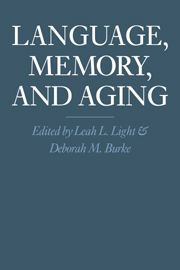Book contents
- Frontmatter
- Contents
- List of contributors
- Preface
- 1 Theories of information processing and theories of aging
- 2 Effects of aging on verbal abilities: Examination of the psychometric literature
- 3 Aging and individual differences in memory for written discourse
- 4 Geriatric psycholinguistics: Syntactic limitations of oral and written language
- 5 Aging and memory activation: The priming of semantic and episodic memories
- 6 Automatic and effortful semantic processes in old age: Experimental and naturalistic approaches
- 7 Integrating information from discourse: Do older adults show deficits?
- 8 Comprehension of pragmatic implications in young and older adults
- 9 Capacity theory and the processing of inferences
- 10 Age differences in memory for texts: Production deficiency or processing limitations?
- 11 Episodic memory and knowledge interactions across adulthood
- 12 The disorder of naming in Alzheimer's disease
- 13 Language and memory processing in senile dementia Alzheimer's type
- 14 Patterns of language and memory in old age
- Author index
- Subject index
2 - Effects of aging on verbal abilities: Examination of the psychometric literature
Published online by Cambridge University Press: 05 January 2012
- Frontmatter
- Contents
- List of contributors
- Preface
- 1 Theories of information processing and theories of aging
- 2 Effects of aging on verbal abilities: Examination of the psychometric literature
- 3 Aging and individual differences in memory for written discourse
- 4 Geriatric psycholinguistics: Syntactic limitations of oral and written language
- 5 Aging and memory activation: The priming of semantic and episodic memories
- 6 Automatic and effortful semantic processes in old age: Experimental and naturalistic approaches
- 7 Integrating information from discourse: Do older adults show deficits?
- 8 Comprehension of pragmatic implications in young and older adults
- 9 Capacity theory and the processing of inferences
- 10 Age differences in memory for texts: Production deficiency or processing limitations?
- 11 Episodic memory and knowledge interactions across adulthood
- 12 The disorder of naming in Alzheimer's disease
- 13 Language and memory processing in senile dementia Alzheimer's type
- 14 Patterns of language and memory in old age
- Author index
- Subject index
Summary
From the perspective of laboratory-based cognitive psychologists interested in aging, psychometric tests designed for the comparative evaluation of individuals have both advantages and disadvantages as a means of studying cognition. Most of the advantages are related to the fact that because many such tests are in a paper-and-pencil format and do not require any special apparatus, they are very easy to administer to individuals in large groups. An important consequence of this ease of administration is that data can generally be obtained from very large samples of individuals which allows (1) analyses of the complete age continuum instead of contrasts between only two extreme groups; (2) examination of the influence of variables such as health, socioeconomic status, time of testing, etc.; and (3) determination of how performance on the test relates to performance on other similar and dissimilar tests, that is, identification of how the test fits into a factorial classification of human abilities.
The major criticisms of psychometric tests from the perspective of cognitive psychology are that most tests appear to involve a mixture of theoretically distinct cognitive processes, and frequently provide only coarse assessments of the effectiveness of particular mental abilities. Both of these characteristics are easily understood in light of the nature and purpose of psychometric tests. That is, in most applied settings there is only a limited time in which to obtain as much information as possible, and thus it is generally not practical to devote 30–50 minutes to assess the subtle nuances of one specific ability as is often attempted in psychological laboratories.
- Type
- Chapter
- Information
- Language, Memory, and Aging , pp. 17 - 35Publisher: Cambridge University PressPrint publication year: 1988
- 20
- Cited by



